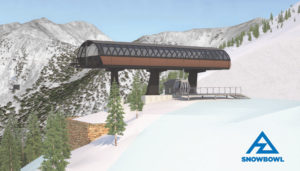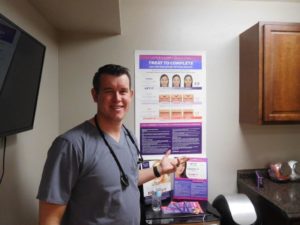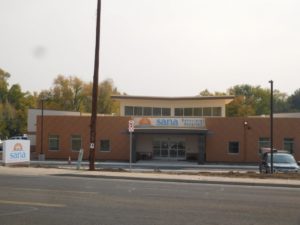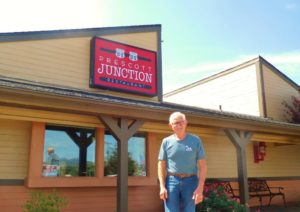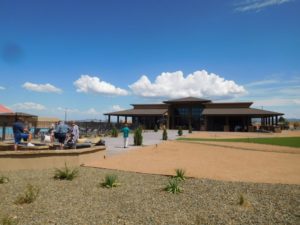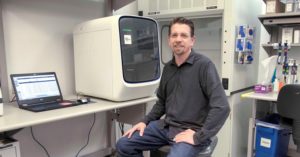 Restaurants, bars, gyms and movie theaters are closed, car dealers are offering to bring vehicles to customers’ doors for a test drive, insurance agents are requesting payments to be slid under their doors and the public trail system is more popular than the downtown square. This, while Governor Doug Ducey is preparing Arizonans for a possible stay-at-home order and identifying essential jobs in industries such as health care, construction, food service, airports, pawn shops, gun supplies and golf courses. Also, the National Guard may start shipping groceries to stores.
Restaurants, bars, gyms and movie theaters are closed, car dealers are offering to bring vehicles to customers’ doors for a test drive, insurance agents are requesting payments to be slid under their doors and the public trail system is more popular than the downtown square. This, while Governor Doug Ducey is preparing Arizonans for a possible stay-at-home order and identifying essential jobs in industries such as health care, construction, food service, airports, pawn shops, gun supplies and golf courses. Also, the National Guard may start shipping groceries to stores.
The new normal of social distancing has businesspeople turning their homes into office spaces for themselves and classrooms for their children. Meetings are canceled, projects are shelved, events are postponed and the whole world seems to have slowed way down, except for those in the healthcare industry and the hard-working athletes driving Amazon trucks.
With four known cases of COVID-19 in the county, Yavapai County Public Health Coordinator Terri Farneti says the pandemic is expected to get worse in Arizona before it gets better. “This is totally different from the flu,” she said. “It’s a lot worse and it seems to be having community spread, passing from person to person.”
But, there is light at the end of the tunnel, says TGen North Director and Associate Professor Dave Engelthaler, Ph.D. “There are relatively few cases daily in China now – it’s definitely on the downswing. We’re not there yet in the U.S.; we’re just getting started. We’re going into a dark tunnel, but the decrease will happen here, too.”
The scientists of TGen North in Flagstaff are genomics first responders. Some of the same researchers who have studied and traced such dangerous pathogens as Ebola and the West Nile virus, are now testing samples for evidence of COVID-19 and working to track this strain of coronavirus. SARS and MERS are also coronaviruses. TGen identified the first COVID-19 case in Flagstaff last month.
“It likely has its origins in bats and has become adapted to humans. It’s possible it came out of markets in China, where they sell live animals,” said Engelthaler. “It acts like the common cold or flu, an upper and lower respiratory disease that’s easily spread through a cough or sneeze. It’s more stable on plastics and stainless steel than on copper and cardboard, and it can last [on surfaces] for hours.”
He also adds that most people in China who contracted the virus – 81% diagnosed – had mild symptoms. “Some people are at higher risk of complications, those over 65 with underlying medical conditions like diabetes, heart and lung disease. Eighty percent of deaths in the U.S. are people over 80 years old. This is where we are going to be most devastated.”
In Yavapai County, at least three of the cases occurred in people identified as senior citizens. Two are in Sedona and one is in Prescott, according to Farneti. “They are all travel related, but the individuals weren’t in contact with each other. One was from Idaho, one from Nevada and one from Ireland.”
She says medical staff are receiving the supplies they need – the gloves, the masks, the gowns – the bigger problem, she says, is the shortage of tests. She advises those with symptoms, coughing, sneezing, fever, shortness of breath, to call their healthcare provider and not show up at an emergency room or urgent care facility. “Your doctor will be able to advise you.”
While researchers work to try to better understand and combat the virus, perhaps the greatest concern is not to overwhelm the medical system. “This is definitely causing a strain on the hospitals. As they are trying to adjust, we shouldn’t have anybody there who doesn’t absolutely need to be there.”
Northern Arizona Orthopaedics, for example, is open during the week and on Saturdays to treat injuries. “Our Saturday clinic can serve to lessen the burden that is likely to be placed on emergency rooms and urgent cares during this crisis,” says Director of Marketing and Physician Relations Carrie Butler. “Our goal, above all else, is to uphold social responsibility. We can treat patients with orthopedic injuries outside the hospital settings so that these hospitals can focus their time and resources on treating those with COVID-19 related symptoms.”
Meanwhile, Engelthaler says we all have a role to play as COVID-19 tightens its grip on the nation. He suggests following public health guidelines, obeying quarantine and social distancing recommendations, and having a business and family plan with two to four weeks of supplies.
“It’s important to help the less fortunate and disadvantaged. These are the individuals who are going to be hurting without our help,” he said. “We can deal with this. We’ll get through it. Most of us will get exposed, but not get really sick. Most of those who are seriously ill will survive.” QCBN
By Bonnie Stevens, QCBN
As of the April QCBN printing deadline, there are 236 confirmed cases of COVID-19 in Arizona with five virus-related deaths. For more information about COVID-19, the Yavapai County emergency phone bank is open 8 a.m. to 5 p.m., Monday through Friday, at 928-442-5103. More information also can be found at yavapai.us/chs and at 211arizona.org/covid-19.





